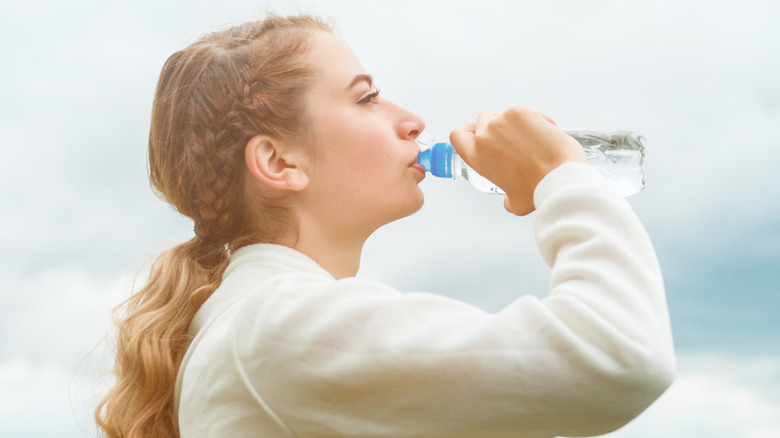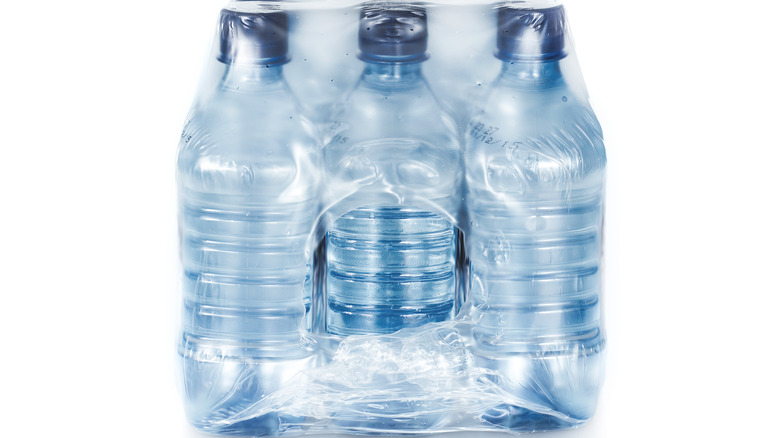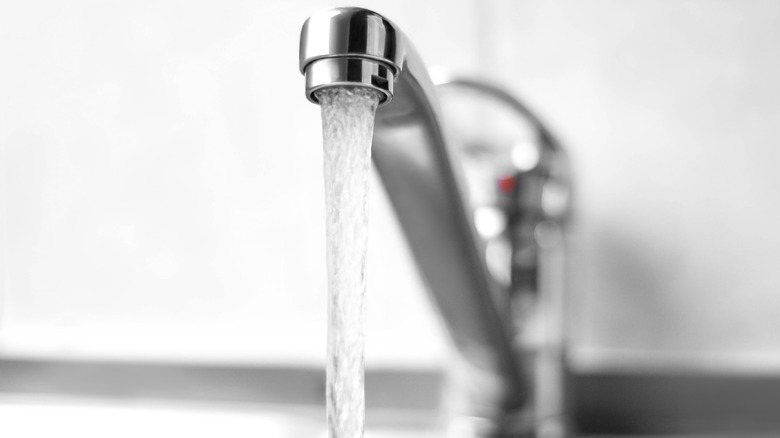Why Drinking Bottled Water Might Be Hurting Your Teeth
Americans have been drinking more and more bottled water over the last decade. According to Statista, annual water bottle consumption grew by nearly 40% between 2010 and 2019, yielding a total average of 44 gallons per person as of 2019. Many people continue to choose bottled water over tap water, a choice that was illustrated by a 2020 American Water survey conducted by OnePoll that found nearly 70% of the 2,004 participants preferred bottled water over tap water (via Study Finds).
Why Americans are opting for bottled water over tap water appears to be linked to health concerns regarding the contents of the water. A 2020 survey conducted by J.D. Power found that one-quarter of Americans never drink tap water (via D Business). Andrew Heath, senior director of utilities intelligence at J.D. Power, comments on some of the top reasons for hesitancy, stating, "A combination of bad taste, bad smell, high mineral content, and general fears about water safety are prompting a sizable portion of Americans — particularly in western and southern states — to avoid drinking their tap water."
Despite bottled water being a popular alternative amongst Americans, it may not be in the best interest of our teeth.
Concerning fluoride and pH levels
According to the U.S. Centers for Disease Control and Prevention (CDC), tap water and bottled water are regulated by different government agencies. The quality of tap water is overseen by the U.S. Environmental Protection Agency (EPA), while bottled water is regulated by the U.S. Food & Drug Administration (FDA). While some bottled water products contain fluoride, others do not, and a lack of fluoride can contribute to oral health problems such as tooth decay.
Low pH levels are also of concern when it comes to bottled water. A neutral pH level for tap water stands at 7, but some bottled water brands can contain a pH level as low as 4, according to McLean Dentistry. Bottled water products containing anything below a pH level of 7 are considered acidic, which can damage tooth enamel. Dr. Eunjung Jo of Astor Smile Dental explains via Daily Mail that "Our enamel starts to erode at a pH level of 5.5 so it's best to avoid any drinks with a pH that is lower than 5.5." Bottled water brands such as Voss, Dasani, Smartwater, and Aquafina were found to have a pH level of 4, and therefore considered "very acidic."
How to make sure you're getting enough fluoride
Experts suggest sticking to bottled water brands with a pH level of 5 or higher. Such brands include Poland Springs, Fiji, Evian, and Essentia (via Reflections Dental Care). If you have no choice but to drink water with a low pH level, experts suggest being mindful of the amount of time spent sipping on the water bottle. Dr. Eunjung Jo explains that consuming an acidic beverage within a half hour is better than drinking it over several hours (via Daily Mail).
For those wishing to take additional preventative measures, Dr. Tema Starkman of High Line Dentistry suggests making conscious choices to ensure you and your loved ones are getting enough fluoride. This is especially true for young children. Dr. Starkman states via Daily Mail, "If they are not drinking a significant amount of tap water and are only drinking filtered, bottled water without measured levels of fluoride, then they could developmentally have problems."



